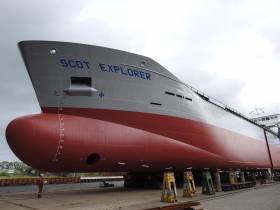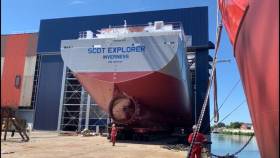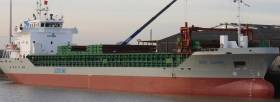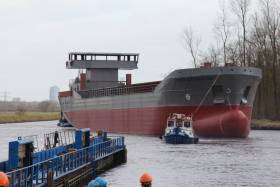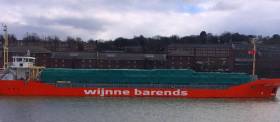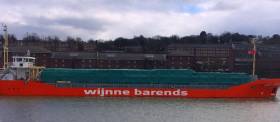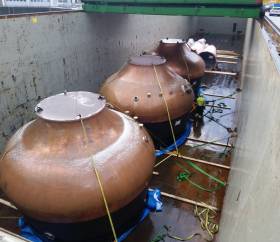Displaying items by tag: Scotline
Second of Three Ship Order Launched for UK Forest Products Operator Which Serves Irish Ports
Scot Explorer became the latest launch for a UK shipping forests products operator, following a christening ceremony that was held at a Dutch shipyard yesterday, writes Jehan Ashmore.
The launch (footage) of newbuild (NB 747) at the Royal Bodewes yard in Hoogezand marked the second of a three-ship order confirmed from Scotline which has its headquarters based in Romford, Kent.
Unlike leadship Scot Carrier launched last year, the latest newbuild of the trio of 4,800dwt sisters, differs having enclosed bridge wings, in order to make manoeuvring easier. The newbuild is due to be completed next month.
As for the final timber products carrier, this newbuild to be named Scot Ranger is scheduled to be delivered at the end of 2020.
Scotline primarily runs liner services throughout northern Europe with regular routes between Sweden, Ireland, Denmark, Germany, Norway and the Baltic States. In addition to those serving the UK, Netherlands and France.
A UK forest-products specialist which has operations including services to Irish Ports have ordered a third newbuild of the same design from a Dutch shipyard, writes Jehan Ashmore.
Scotline Marine Holdings Ltd confirmed the order from Royal Bodewes Shipyard of Hoogezand from where newbuilding (yard no.750) is to be named Scot Ranger. This is the same name used previously following the sale earlier last year of Scot Ranger which had seen this older tonnage discharge cargoes in Wicklow Port.
Scot Ranger follows the 4,800dwt Scot Carrier launched last year and Scot Explorer (pictured above) which is due to be completed in November 2019. The third newbuild has a delivery scheduled for the end of 2020.
According to Scotline although of the same design, Scot Ranger will be certified to ice class 1A, enabling passage within Swedish and Finnish waters. This makes the new addition to the fleet of 14 vessels ideal for the operator's liner services out of the Baltic.
The Romford in Kent based operator primarily runs liner services throughout northern Europe with regular routes between Sweden, Ireland, Denmark, Germany, Norway, the Baltic States and those serving the UK, Netherlands and France.
Also in Kent, the forest-products operater exclusively has terminals and an office in Rochester on the river Medway and another site located at Inverness, Scotland.
ScotLine Orders Second Newbuild to Dutch Yard
#Ports&Shipping - Forest products operator Scotline Ltd whose vessels are regular callers to Irish east and south coast ports, have announced in partnership with a Dutch yard to exercise an option for a second newbuild of the 4785dwat Bodewes Trader design.
The newbuild's in-house design is from the yard of Royal Bodewes Group BV in Hoogezand where the cargoship is to be named MV Scot Explorer and launched in third quarter of 2019.
As previously reported on Afloat, the first newbuild MV Scot Carrier is currently under construction in Hoogezand with a launch expected to be in July and delivery in October 2018.
MV Scot Explorer will have a length of 89.98 meters and a beam of 15.20 meter and a maximum sailing draft of 5.68 meters. The newbuild will be powered by a MAK engine whilst being fully container fitted, with Swedish ice class 1B. When entering service the new ship will sail under the British Flag and classed under Lloyds Register.
The second newbuild will be a near-identical sister to MV Scot Carrier. Throughout the build of this first newbuild, both parties have had regular and open dialogue, looking at different ideas and concepts in order for the partnership to work well for both family-owned companies.
The MV Scot Explorer will be the next addition to Scotline’s fleet of 9 owned vessels, where we are looking to renew some of our older tonnage. Currently, Scotline has 15 ships in a fleet ranging from 1300dwcc to 4500dwcc, which gives a wide verity of scope for meeting customers’ varying needs.
Royal Bodewes Group which Afloat adds is located inland in the north-east of the Netherlands, employs 200 and has launched 450 ships since 1812. In modern times, Arklow Shipping have had numerous short-sea traders built at this waterway canal-side yard. Most recently, Arklow Villa launched a month ago was the final of 10 ships ordered that began in 2015 with the in-house 5,150dwat Eco-Traders series.
Since the shipyard began more than 200 years there have been many developments and this continues with innovation in their designs as well as being dynamic in workflow and building processes which the group is constantly striving for efficiency. To accomplish this, in 2014, a new production hall was built alongside the existing hall at the shipyard in Hoogezand, which was completed in January 2015, providing additional capacity.
Now Royal Bodewes Group is developing the yard by extending the two production halls to the waterfront and thus creating two construction sites meaning two ships can be built side by side. The infrastructure outside will also be improved. This is all done to enable Royal Bodewes to minimize congestion and provide the best service to their clients, both now and in the future. Construction of the production halls is expected to be completed in autumn 2019.
New Navigator to Trade Timber On Short-Sea Services
#Newbuild - Scot Line a trader of packaged timber on the Irish Sea have added a 88 metre long newbuild to its fleet that operates an Ireland-UK-Scandinavia liner service, writes Jehan Ashmore.
The newbuild Scot Navigator will become the 10th vessel of the fleet in which such ships are regulars to Irish east coast ports, Dublin and 35 miles to the south Wicklow. The port became the first of five Regional Ports of Significance having been transferred to local authority control under the 2013 National Ports Policy.
Imports of packaged timber are for the construction industry, a 'bread and butter' cargo trade for Wicklow Port. A role potentially involving Scot Navigator which was launched last month in the Dutch yard of GS Yard B.V. in Groningen. Delivery and operational service is scheduled for May.
The modern efficient design of Scot Navigator makes for an ideal addition to the operators expanding fleet, being built with a timber-fitted capacity of about 5,500 cubic metres. The newbuild also complies with all the latest legislation including provisions for ballast water treatment.
Scot Navigator will be powered by a Caterpillar engine. The new ship is to sail under the UK flag like the rest of the fleet among them Scot Leader which was acquired in recent months. This cargoship is also of similar length but with a larger timber-fitted capacity of 6,325 cubic metres.
Shipping Review: Scot Take Time-Charter, Green Orange Meet in London & Windy Waterford
#ShippingReview - Jehan Ashmore reviews the shipping scene from among the following stories of the past fortnight.
Scotline the short-sea timber products operator has taken a time-charter of Lady Ariane from a Dutch owner. The cargoship sailed from Varberg, Sweden to Wicklow Port.
A pair of 87m newbuild cargoships of the mixed flagged fleet of Arklow Shipping made calls to the Port of London. Irish flagged Arklow Cadet was joined on the Thames by the brand new Dutch flagged Arklow Valour having anchored off the Kent coast: see Port of Dover freight record.
Across the North Sea at Emshaven, the Netherlands is where newbuild Arklow Valour had undergone seatrials. More recently the bitumen tanker Iver Ability docked there and not Delfzijl as expected.
Dun Laoghaire-Rathdown County Council executive will undertake a full risk assessment into transfer ownership of Dun Laoghaire Harbour to the local authority, it has emerged.
A first batch of tower sections for wind turbine projects arrived at Port of Waterford for GE Wind on board BBC Orion (2007/7,223grt). A further two projects cargoes are due to the port this year.
Scotline Take Time-Charter of Dutch Short-Sea Ship Trading to Ireland
#Scotline – Scotline the short-sea timber products operator recently took a time-charter of Lady Ariane which berthed in Wicklow Port today, writes Jehan Ashmore.
The box shaped singledecker had sailed from the Swedish port of Varberg. The Scandinavian port that firmly established Scotline as an operator from the late 1970’s in the transportation of forest-product cargo of logs from Inverness.
In the present day, the company are responsible for transporting a high percentage of all softwood (packaged timber) into the UK through operating liner services. This includes operations to Ireland.
The time charter of Lady Ariane is from Dutch short-sea operator, Wijnne Barends. Also added to the fleet is Scot Leader which was recently acquired and brings the fleet total to 12 vessels.
In regards to Wijnne Barends they are based in Delfzijl. The North Sea port is where the asphalt/bitumen tanker Iver Ability is bound to.
The red-hulled ship anchored in Dublin drew much public attention following months spent offshore following a ‘reaction’ during transport of bitumen in Dublin Port last summer.
Iver Ability was monitored yesterday by Afloat while transiting the Strait of Dover. At it’s narrowest point the distance of the Strait is a mere 33.3 kilometres (20.7 miles).
On a daily basis there is around 400 vessels transiting through the Strait, the world’s busiest channel. Asides ships of many types there are ferries criss-crossing between the Port of Dover (see record freight) and the French ports of Calais and Dunkerque.
This afternoon the tanker is at anchorage of the West Frisian Islands. The archipelago lies off the approaches to the Ems Estuary that leads to Delfzijl.
#WhiskeyPlant - A cargoship in Scotland was delayed in loading distillery tanks bound for an Irish whiskey plant due to recent storms hitting the UK coast, writes Jehan Ashmore.
The 81m short-sea trader Scot Explorer (1996/2,521dwt) was stuck in Buckie Harbour. The port in north-east Scotland on the Moray Firth, east of Inverness, is from where Scotline made its first shipment in 1979 bringing logs to Germany, before relocating to a port in Sweden.
According to the shipping company the extremely rough weather prevented Scot Explorer in loading whiskey distillery tanks, even in the shelter of the harbour. The project cargo was bound for Jameson's Old Distillery plant in Midleton, Co, Cork.
Last month Afloat reported on Scotline’s latest ship acquisition of the 90m Odertal, which was renamed Scot Leader which has a 4,507dwt.
The newcomer joins the Romford, England based fleet which specialise in the transportation of sawn timber products. This involves a network of liner services linking the UK, Ireland, Scandinavia and Germany.



























